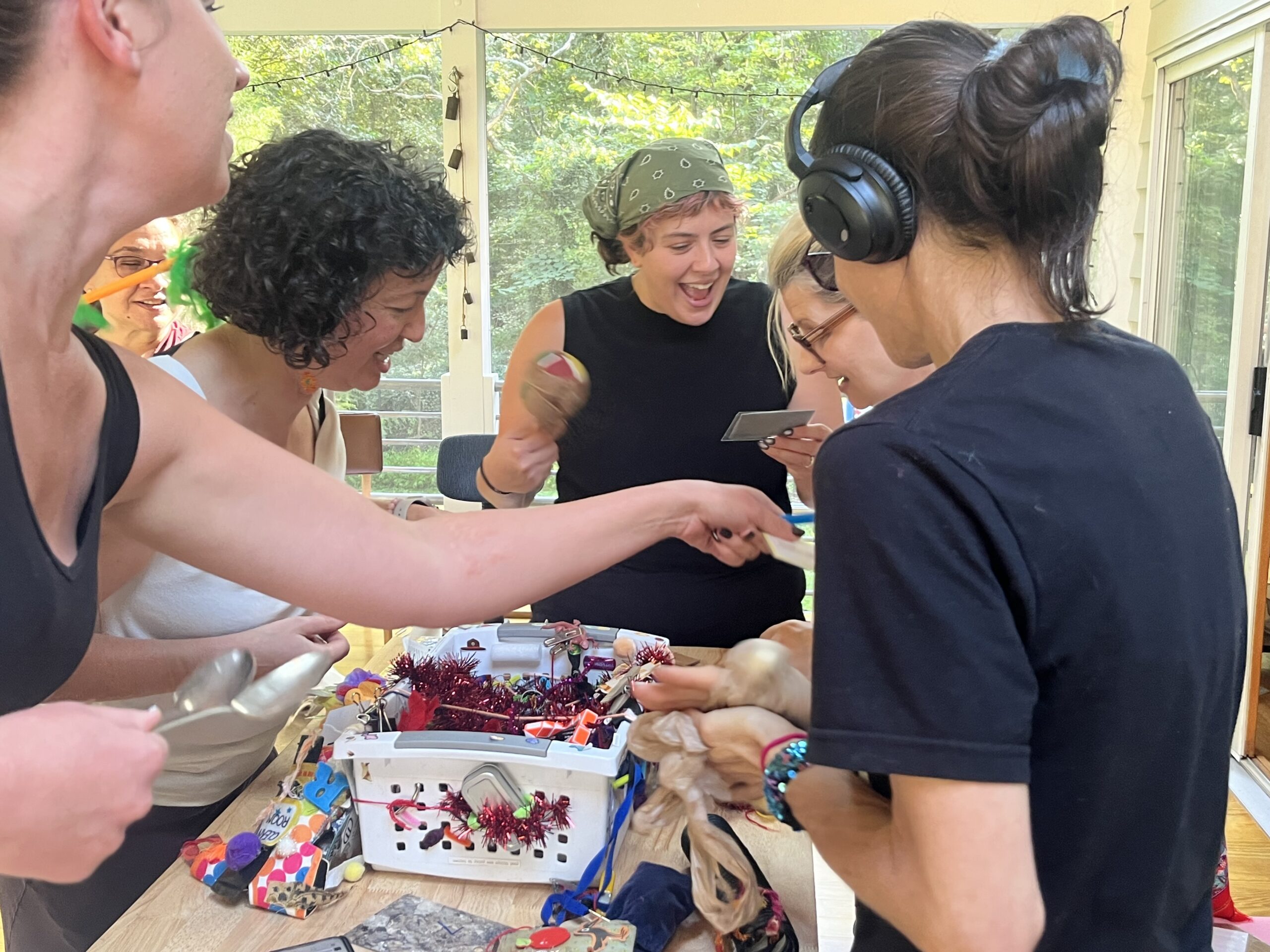Coming to Our Senses about Eating Disorders Treatment is an exploration of how Sensory Processing Disorder (SPD) and Autism Spectrum Disorder (ASD) impacts a person’s relationship with food, the eating process and body perception. Current research shows autism is overrepresented in individuals battling an eating disorder (ED) and those with both disorders have the poorest treatment outcomes. Research also supports a link between SPD and ARFID as well as a link between visual processing patterns and body dysmorphia.
Through didactic lectures and experiential activities, this 4-day workshop offers a unique perspective of combined clinical and personal experiences. Participants will see the world as it’s experienced by someone with SPD, ASD and an ED. We will consider the following questions:
- What if food preferences and aversions are not dictates of an irrational “ED voice” but are logical choices given a person’s unique sensory processing system?
- What if food rituals and rules stem not from unreasonable needs for control but, rather, are effective life-style routines congruent with neuro-divergent thinking?
- What if body image distortions and dysmorphia are not errors in thinking but are the results of incongruencies in far and near senses?
- How can understanding our sensory processing system and neurodivergent thinking help us to more effectively support recovery from eating disorders?
IMPORTANT UPDATE: This course is now a Tier 1 course!! There are no prerequisites for taking this course. Participants can begin their Embodied Recovery for Eating Disorders training with this course.
ERI welcomes people of diverse physical abilities and offers programs which are Americans with Disabilities Act (ADA) compliant. If you have requests or suggestions that would make enhance participation, please contact our registration administrator at: registration@embodiedrecovery.org
Course Details
Description
This 4-day training begins with an overview of the theoretical maps and 4 Principles of the Embodied Recovery for Eating Disorders approach which establishes the links between our sensorimotor system, cognitive processing, neurological regulation and capacity to engage in “normative eating” and accurate body image. We then dive into an exploration of the human sensory system. Through didactic presentation and experiential activities, participants will examine the anatomy and physiology of our near and far senses and how they organize to support attachment and defense. Looking through the lens of Sensory Processing Disorder, we will reconsider the function of and driving force behind common eating disorder behaviors. We end 2nd day with a powerful experiential activity which will give participants a felt understanding of what the everyday task of grocery shopping is like for a person with SPD.
During the 3rd day of this training we explore the use language, cognitive processing, and emotional experiences of people with Autism Spectrum Disorder (ASD). With another powerful experiential activity and case study examples, participants get a felt sense understanding of the world of someone with both Sensory Processing Disorder (SPD) and Autism Spectrum Disorder (ASD). Participants will get a glimpse at the challenges faced by neurodivergent people when navigating daily tasks of eating and accessing effective treatment for eating disorders.
The 4th day focuses on assessment and treatment planning. We discuss the function and impact of masking behaviors, tools for increasing interception, and the use of the Ziggurat Model in supporting eating disorders recovery. Kim shares coping strategies and tools which have been effective in her personal journey and how to individualize treatment planning to match the strengths and challenges of neurodivergent clients.
Agenda
Day 1
9:00-10:00 Arriving, Introductions
10:00-10:30 Definition of Sensory Processing Disorder (SPD), Near Senses and Far Senses, Review of research linking SPD and Eating Disorders (ED)
10:30-10:45 BREAK
10:45-11:30 Exploring Touch: How it organizes in states of safety and defense and how processing issues are expressed in ED behaviors.
11:30-12:15 Exploring Smell: How it organizes in states of safety and defense and how processing issues are expressed in ED behaviors.
12:15-1:45 LUNCH
1:45-2:30 Exploring Taste: How it organizes in states of safety and defense and how processing issues are expressed in ED behaviors.
2:30-3:15 Exploring Hearing: How it organizes in states of safety and defense and how processing issues are expressed in ED behaviors.
3:15-3:30 Break
3:30-4:15 Exploring Sight: How it organizes in states of safety and defense and how processing issues are expressed in ED behaviors.
4:15-5:30 Case studies and Q and A.
Day 2
9:00-9:45 Arriving, checking in
9:45-10:45 Exploring Proprioception: How it organizes in states of safety and defense and how processing issues are expressed in ED behaviors.
10:45-11:00 BREAK
11-12:00 Exploring Vestibular: How it organizes in states of safety and defense and how processing issues are expressed in ED behaviors.
12:00-1:30
1:30-3:00 Exploring Interoception: How it organizes in states of safety and defense and how processing issues are expressed in ED behaviors. Interoception Curriculum
3:00-3:30 Sensory Processing Disorder and Body Image
3:30-3:45 BREAK
3:45-4:30 Experiential activity: Going to the Grocery Store with Sensory Processing Disorder
4:30-4:45 Sensory Processing Assessment tools
4:45-5:30 Q and A
Day 3
9:00-9:30 Kim’s morning routine: Sensory Diet for Regulation
9:30-10:45 What is Autism:
Early Signs
Autistic Catatonia
ASD traits: Language
10:45-11 Break
11:00-12:15 ASD traits: Thinking And Behaving; Emotions
12:15-1:45 Lunch
1:45-2:30 Experiential Activity: Sensory Box
2:30-3:15 ASD and ED: Action Cycle Barriers and Interventions to support normative eating
3:15-3:30 BREAK
3:30-4:30 ASD and ED: Action Cycle Barriers and Interventions to support normative eating
4:30-5:30 Q and A, close
Day 4
9-9:30 Mindfulness practice
9:30-10:15 Case Study in Assessing and Building Capacity for Regulation for Clients with ASD: Self-Awareness and Discovery
Masking
Developing Interoceptive Awareness-Use of Interoception Curriculum
10:15-10:30 BREAK
10:30-12:00 Case Study in Assessing and Building Capacity for Regulation for Clients with ASD: Self-Awareness and Discovery
Identifying Patterns of Behaviors and Triggers for Dysregulation
12:00-1:00 Lunch
1:00-1:30 Treatment Planning: Ziggurat Model
1:00-2:45 Case Studies: Coping Strategies and Tools
2:45-3:00 BREAK
3:00-3:45 Case Studies: Coping Strategies and Tools
3:45-4:00 close
Objectives
Participants will be able to:
- Explain three components of Sensory Processing Disorder-Modulation, Discrimination, Motor Function.
- List and describe the function and anatomy of 5 far senses and 3 near senses.
- Identify when sensory input is neurocepted as safe or dangerous and describe the impact of this neuroception on eating and feeding processes of ingestion, digestion, and elimination.
- Describe the impact of SPD on food selection, food preparation and eating behaviors.
- List communication, social, language, behavioral and cognitive processes characteristic of Autism Spectrum Disorder (ASD).
- Describe how ASD impacts eating behaviors.
- Discuss the use of the Ziggurat Model for assessment and treatment panning in ED treatment with ASD clients.
- Design 1 intervention to help clients with SPD and ASD to increase autonomic nervous system regulation.
- Explain when referral for specialized treatment for SPD and/or ASD is appropriate.
- Describe the link between Sensory Processing Disorder and Body Image distortions
- Design 3 interventions to support “normative eating” for people with sensory sensitivity or low-registry modulation responses to sensory input.
- Design 3 interventions to support people with Autism Spectrum Disorder engage in ADL’s associated with obtaining, selecting, preparing, ingesting and digesting food.
Audience
The training is appropriate for all members of multidisciplinary eating disorders treatment teams including mental health professionals (Psychologist, Social Workers, Counselors, Marriage and Family Therapists, Creative Art Therapists), medical providers (MD’s, Psychiatrists, Nurses), Dietitians, Occupational Therapists, treatment program staff and adjunct providers such as yoga therapist.
Prerequisites
UPDATE: There are no prerequisites for this course.
Tuition and Refund Policy
See the individual cohort listing for tuition fees.
BIPOC/LGBTQ AND STUDENT SCHOLARSHIPS : We reserve select slots in each training for reduced rate scholarships. If you would like to request a scholarship, please contact Jenn at registration@embodiedrecovery.org.
REFUND: Refund of full tuition paid minus $100 available if cancellation is made up to 6 weeks prior to start of the training. Refund of 50% of tuition paid minus $100 available if cancellation is made between 2-6 weeks prior to start of training. No refund available available if cancellation is made within 2 weeks of start of training.
Continuing Education
The Embodied Recovery Institute (ERI) has been approved by NBCC as an Approved Continuing Education Provider, ACEP No. 7539. Program that do no qualify for NBCC credit are clearly identified. ERI is solely responsible for all aspects of the programs. 25 CE’s are available to participants who attend the entirety of this program and complete the course evaluation.
The Embodied Recovery Institute, Provider Number 2075, is approved as an ACE provider to offer social work continuing education by the Association of Social Work Boards (ASWB) Approved Continuing Education (ACE) program. Regulatory boards are the final authority on courses accepted for continuing education credit. ACE provider approval period: 9/16/2025-9/16/2028. Social workers competing this course receive 25 General continuing education credits.
Conflict of Interest Statement
There is no known commercial support or conflict of interest for this program.

